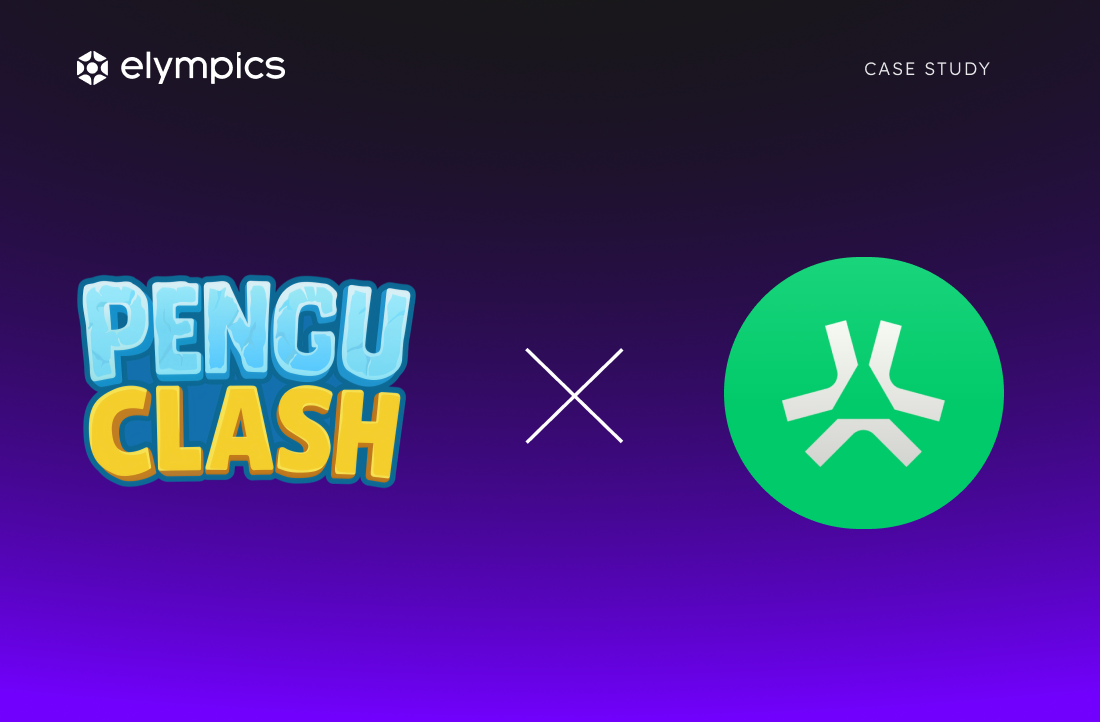The story of Web3 gaming has often been one of ups and downs — hype cycles followed by disillusionment, promises of innovation overshadowed by clunky onboarding and speculative token models. But beneath all the noise, a quiet revolution has been building this entire time - games that are fun, accessible, and built with real players in mind are starting to thrive. The recent integration of Elympics with Abstract is one of the clearest signals yet that Web3 gaming is entering a new, more mature phase.
Pengu Clash, a multiplayer mini-game, is defining the next wave of web3 gaming and proving that it can become a case study for what frictionless onboarding, real rewards, and scalable infrastructure can achieve. By combining Abstract’s ecosystem with the Elympics SDK, Pengu Clash demonstrates how Web3-native experiences can finally feel as seamless as traditional mobile gaming — while still delivering all the benefits of tokenized economies and onchain play.
Frictionless Entry Point
One of the biggest barriers to Web3 adoption has always been onboarding. Wallet setups, confusing gas fees, and complex token purchases scare off even the most curious players. Elympics and Abstract take that problem off the table by allowing players to join directly with Apple Pay and Google Pay onramps. No wallets, no crypto prerequisites, no friction — just a clean, familiar flow that mirrors any mainstream mobile game.
That accessibility Pengu introduces is not just a UX upgrade, but a paradigm shift. With all these integrations, Pengu Clash becomes the kind of game streamers on Abstract can introduce to their audiences instantly, without losing them to confusing blockchain tutorials. Players can jump in, compete, and start earning rewards in a matter of minutes.
Why Pengu Clash Works for Players
So what do players actually get once they’re inside the game? Pengu Clash has struck the right balance between fun, competition, and tangible rewards. Here is what it means:
- Earn More ICE → Earn More XP: As players engage, they accumulate ICE, which translates into XP for Abstract’s upcoming airdrop. It’s a direct link between playing and being rewarded for loyalty and time spent.
- Ownership of Assets: Players gain access to in-game items that carry real value. This isn’t just cosmetic fluff we all have seen many times, but meaningful ownership that players can carry with them beyond the game.
- Real Prizes: Weekly seasons and $PENGU tournaments give participants the chance to win tokens and climb leaderboards. The structure incentivizes regular play, while the prize pools keep competition alive.
By delivering a mix of short-term incentives and long-term value, Pengu Clash shows what it means to design with player-first economics, rather than speculative farming.
What Developers Gain from the Model
The success of Pengu Clash is just as important for developers as it is for players. For studios and indie creators, Elympics provides the missing infrastructure to turn an idea into a live, scalable Web3 game — without needing to reinvent multiplayer servers or navigate blockchain complexity.
Here is what Pengu Clash offers:
- Rapid Launch: Leveraging the Elympics SDK meant developers could use prebuilt templates for multiplayer logic, tournaments, and onchain settlements, drastically reducing time-to-market.
- Scalability Across Chains: By deploying on Abstract, the game tapped into a new audience while retaining the ability to scale cross-chain. This flexibility future-proofs the Pengu for broader adoption over the coming months and years.
- Proof of Traction: In just two weeks, Pengu Clash recorded 200,000 games played and reached 7,000 daily active users — clear evidence that well designed onboarding and competitive mechanics drive engagement.
For developers considering a move into Web3, the message is crystal clear - with the right tools, building skill-based, token-powered games doesn’t have to be complex, risky, or slow. It’s time to build quality with ease.
New Era for Social and Competitive Play
Pengu Clash’s performance also reveals a larger shift happening in how games are distributed and consumed. Social platforms like Abstract are no mere communication tools — they’re becoming hubs of entertainment in their own right, where embedded mini-games can be played by millions of people. Elympics’ infrastructure is built precisely for this environment — lightweight games, competitive formats, and seamless monetization that plug directly into platforms with existing audiences.
For players, this means competitive gaming is no longer locked behind big esports titles with no rewards except for the top tier players or app-store downloads. For developers and communities, it means instant distribution — your game can live where people already are actively spending their time, with rewards and tournaments running natively in those spaces.
Final Thoughts
The collaboration between Abstract and Elympics perfectly shows the direction Web3 gaming needs to follow - frictionless, rewarding, and scalable. Players get meaningful rewards without wading through crypto jargon or countless cumbersome mechanisms and concepts. Developers get infrastructure that handles the heavy lifting while letting them focus on fun and engaging experiences. And platforms like Abstract benefit from games that bring people back every day.
Elympics’ Play2Win philosophy has always been about making skill-based competition the backbone of Web3 gaming. Pengu Clash proves that when you combine the right infrastructure with a community-focused distribution channel, you don’t just get a fun game — you get a model for the next generation of onchain entertainment.
Stay updated with announcements, game launches, and behind-the-scenes from the team building the future of competitive Web3 gaming - Follow Elympics on X
Enjoyed this article? Dive deeper into the future of gaming by exploring more insights and stories on our blog. Your next favorite read is just a click away.























